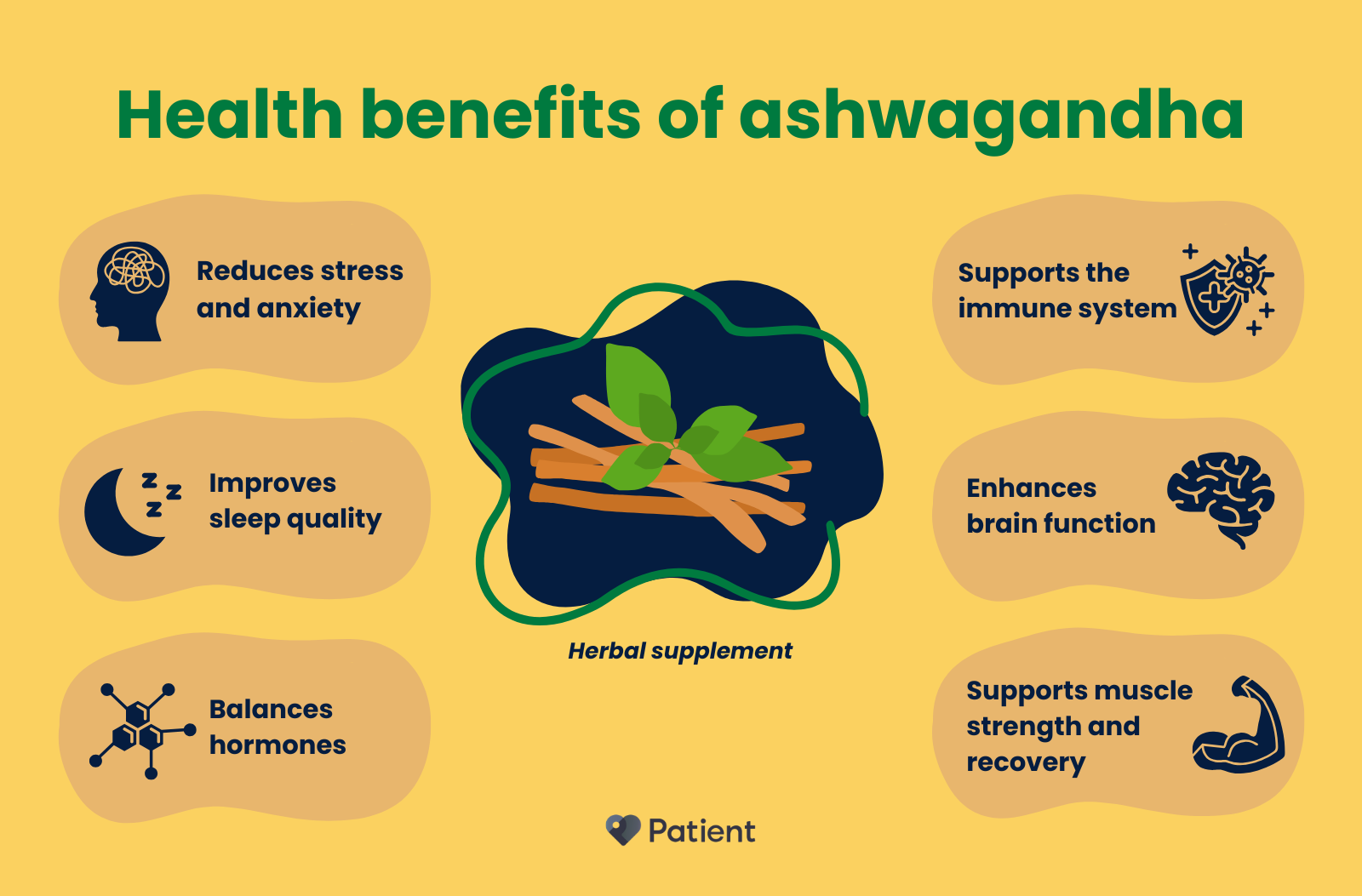
What is ashwagandha? Health benefits, uses, and side effects
Peer reviewed by Dr Colin Tidy, MRCGPAuthored by Heather AinsworthOriginally published 6 Nov 2025
Répond aux besoins du patient lignes directrices éditoriales
- TéléchargerTélécharger
- Partager
- Langue
- Discussion
Ashwagandha (Withania somnifera) is a centuries-old herb that’s gaining popularity in today’s wellness world. Also known as Indian ginseng or winter cherry, it’s traditionally been used to help people feel calmer and more energised.
Here we look at what it is used for, evidence-backed benefits, and the side effects you should know about.
Dans cet article :
With so many of us juggling busy lives and looking for natural ways to support our health, it’s no surprise that ashwagandha is getting a lot of attention for its potential benefits - from easing stress to boosting energy and supporting overall wellbeing.
This ancient herb has been a key part of Ayurvedic medicine for thousands of years, and today, thanks to new scientific research, it is being rediscovered for its wide range of potential health effects.
Whether taken as a supplement, powder, or tea, ashwagandha is now one of the most talked-about herbs in modern wellness circles.
Poursuivre la lecture ci-dessous
What is ashwagandha used for?
Ashwagandha is known as an adaptogen. This means it helps your body handle physical and mental stress better.
People use ashwagandha to feel calmer, more balanced, and better able to cope with anxiety and depression1. Studies also show it may help improve sleep quality2, lower cortisol levels1 (our main stress hormone), and even support muscle recovery after workouts.
Ashwagandha is available as capsules, powders, or liquid extracts, and can be mixed into teas, smoothies, and water, or taken in tablet form.
Health benefits of ashwagandha

Graphic: Heather Ainsworth
What are the health benefits of ashwagandha?
Back to contentsAshwagandha has earned its reputation as a powerhouse herb thanks to its wide range of potential health benefits, many of which are now supported by scientific research.
1. Helps reduce stress and anxiety
One of its most well-known effects is its ability to reduce stress and anxiety. As an adaptogen, ashwagandha helps regulate cortisol levels1 leading to a calmer mind and improved emotional balance.
2. Improves sleep
Further research suggests that it can help with insomnia by calming the nervous system and promoting relaxation2. Ashwagandha may not only help people fall asleep faster but also improve the overall quality of sleep.
3. Supports physical performance and muscle recovery
Ashwagandha has been shown to enhance sports performance in athletes and fitness enthusiasts by increasing muscle strength, improving endurance, and promoting faster recovery3.
4. Enhances brain function
Ashwagandha may enhance memory, attention, and overall brain function by reducing oxidative stress and supporting the health of nerve cells4.
5. Balances hormones
Further studies show that it may help boost testosterone levels and fertility, particularly in men, by supporting hormone balance and reproductive health5.
6. Helps maintain a healthy immune system
Ashwagandha’s anti-inflammatory and antioxidant properties contribute to overall immune support6 and may help reduce some inflammation-related conditions over time7.
Poursuivre la lecture ci-dessous
What are the side effects of ashwagandha?
Back to contentsWhile ashwagandha is generally considered safe for most people to take short-term (up to 3 months), it’s important to be aware of potential side effects - especially if you're new to using herbal supplements or have taken a large dose.
Common side effects of ashwagandha are:
Diarrhée.
Sensation de malaise (nausée)
Être malade (vomissements).
Somnolence.
If side effects continue or worsen, stop taking ashwagandha immediately and contact a healthcare professional for advice.
Note: the long-term safety of ashwagandha is currently unknown and therefore it is advised to only be used short-term.
Who should not take ashwagandha?
Back to contentsPregnant women – Ashwagandha may stimulate the uterus and potentially cause miscarriage.
Breastfeeding women – There is insufficient research on its safety during breastfeeding and therefore it is advised that breastfeeding women do not take ashwagandha.
People with autoimmune diseases – Ashwagandha can stimulate the immune system, which may worsen autoimmune conditions such as rheumatoid arthritis, lupus, and multiple sclerosis.
People taking medications for thyroid, blood pressure, anxiety, or sedatives – ashwagandha may interact with certain medicines, affecting their effectiveness.
As with any supplement, it is best to consult with a healthcare professional before starting ashwagandha - especially if you're on medication, have underlying health conditions, or are unsure about the proper dosage for your needs.
Poursuivre la lecture ci-dessous
Résumé
Back to contentsAshwagandha is a traditional Ayurvedic herb known for reducing stress, boosting mental clarity, enhancing physical performance, and supporting sleep and immune health. Studies suggest it can also improve muscle strength, endurance, and recovery.
While generally safe for short-term use, it may cause side effects such as diarrhoea or drowsiness and isn’t suitable for everyone - so it’s important to check with a healthcare professional before trying it.
More research is needed to fully understand its benefits and risks. In the meantime, you might find our article Stress-relieving tips to try every day helpful - it offers expert advice and science-backed strategies to manage stress and anxiety.
Pour en savoir plus
Back to contents1. Salve et al: Adaptogenic and Anxiolytic Effects of Ashwagandha Root Extract in Healthy Adults
6. Tharakan et al: Immunomodulatory Effect of Withania somnifera (Ashwagandha) Extract
Patient picks for Vitamins and supplements

Régime et nutrition
10 everyday foods high in vitamin D
Vitamin D plays an essential role in bone health, immunity, and mood, yet many people in the UK don’t get enough, especially during the darker months. While sunlight is the main source, certain foods can also help to boost your levels naturally. In this article, we explore vitamin D foods you might not expect and how to include them in your diet.
by Josh Alderman

Régime et nutrition
Les suppléments de ZMA sont-ils vraiment efficaces ?
The ZMA supplement - also known as zinc magnesium aspartate - is used by people looking to improve their sleep and also by fitness enthusiasts who want to build muscle and increase their stamina. Yet there is little evidence to support the use of ZMA in individuals who aren't nutrient deficient. The best way to absorb and benefit from the nutrients in ZMA is to eat a healthy, well-balanced diet.
par Amberley Davis
Poursuivre la lecture ci-dessous
Historique de l'article
Les informations contenues dans cette page ont été évaluées par des cliniciens qualifiés.
Prochaine révision prévue : 6 novembre 2028
6 novembre 2025 | Publié à l'origine
Auteur: :
Heather AinsworthExaminé par des pairs
Dr Colin Tidy, MRCGP

Demandez, partagez, connectez-vous.
Parcourez les discussions, posez des questions et partagez vos expériences sur des centaines de sujets liés à la santé.

Vous ne vous sentez pas bien ?
Évaluez gratuitement vos symptômes en ligne
Inscrivez-vous à la newsletter destinée aux patients
Votre dose hebdomadaire de conseils santé clairs et fiables, rédigés pour vous aider à vous sentir informé, confiant et maître de la situation.
En vous abonnant, vous acceptez notre politique de confidentialité. Vous pouvez vous désabonner à tout moment. Nous ne vendons jamais vos données.